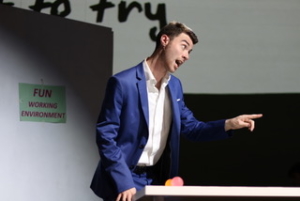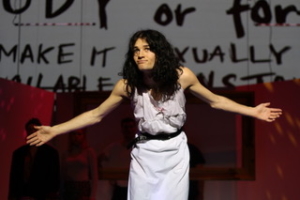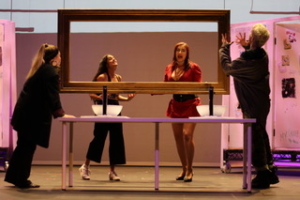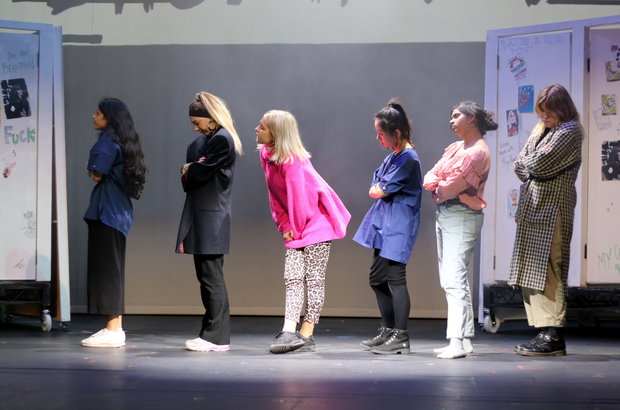SELMA REZGUI reviews Revolt. She Said. Revolt Again at Bloomsbury Theatre.
A series of straws that break the camel’s back. Alice Birch’s Revolt. She said. Revolt again asks what would happen if certain things, ostensibly small things, harmless everyday things, would happen one time too many. What if you just… exploded?
The play, directed by Seren John-Wood, is broken into 4 fragments of furious imperatives. Revolutionise the language. Invert it. A couple talks over dinner. The man (Gabriel Fagan) unsexily proclaims that he is desperate to ‘make love to you!’ His partner (Suhanya J de Saram) objects. Make love with, she insists: language matters. Soon they’re dancing around one another on the stage verbally jousting, and she is destroying his naïve Freudian notions of a gap being there to be filled, and telling us in no uncertain terms who gets to put what in whom. The dialogue is precise and angry, and often very funny.

The play commands: Revolutionise the work. (Engage with it.) Lorcan Archibald is a loathsome Cheshire Cat of a boss trying to persuade his weary and sardonic employee (Holly Sullivan) that work is fun. It’s an on-the-the-nose, but accurate and entertaining take-down of start-up culture. There are beers and cookies (cute!) on Fridays and you can wear jeans in the office but oops did we mention you work 12 hours per day, we’ll call you at the weekend and the only reason we can maintain our productivity is with ungodly quantities of cocaine. Archibald is eye-twitchingly precarious in his manic positivity, a hair’s breadth from losing the plot. Deep breath. There’s a work bar upstairs! Have an IPA and get back to your desk!
The stage contains carefully choreographed chaos. Between each vignette, a chorus evokes the world behind the scenes of similar productions. Actors, directors, producers run hither and thither. There’s a big dressing room mirror, and portaloos around which the action revolves. Cheryl Wang’s production and Mari Katsuno’s set design combines an explosion of things with bright projections, scrawled slogans and thudding music. The stage is so full at all times it’s difficult to know where to look.

The first half is concluded by a monologue by Jamie Cottle, who is charismatic and rough with rage throughout the play. They remind us that there are no gender-neutral toilets in the Bloomsbury Theatre. What is there to do but to piss into the aisles? Into our shoes. They hope that our pissy toes and socks will remind us of them. And they do. They bellow ‘Interval’ and the lights come up, and everyone shuffles uncomfortably in their seats, newly aware of the binary ease with which they can urinate.
The play’s second half is less comic than the first, feels heavier. Revolutionise the world (do not reproduce). A fragile-looking child kneels at the front of the stage and sicks up red spaghetti while two generations of women in its family go head to head on insomnia, abandonment, abuse. It feels uneasy and I’m not sure the play quite earns the post-apocalyptic bleakness which it indulges in here.

The final section, Galvanise, presents a garden of earthly pleasures. The stage is filled with bodies and items which clatter around one another, the audience’s attention being drawn to snatches of one interaction, then another. The play descends into shrill histrionics and fury and frustration emerge in full force, but so, like from Pandora’s Box, does a small glimmer of hope. The play’s gender-irrelevant casting side-steps what could become a view of feminism which is interested in one axis of oppression at the expense of all others. The play’s ideas are not as complex as they could be but perhaps there is little room for nuance in a production that delivers its manifesto in a series of punches to the chest.
Revolt ran from the 14th-16th November at Bloomsbury Theatre, more information here.
Featured image courtesy of Dione Lemoni.





